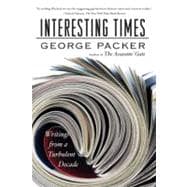
What is included with this book?
George Packer is a staff writer for The New Yorker and the author of several books, most recently The Assassins’ Gate (FSG, 2005). His reporting has won four Overseas Press Club awards.
| Introduction | p. ix |
| After September | p. 11 |
| Living Up to It | p. 3 |
| Stop Making Sense | p. 18 |
| On the Morning After Saddam | p. 23 |
| A Democratic World | p. 42 |
| The Lesson of Tal Afar | p. 57 |
| Knowing the Enemy | p. 92 |
| Betrayed | p. 114 |
| Over Here | p. 153 |
| Trouble Spots | |
| The Children of Freetown | p. 167 |
| How Susie Bayer's T-shirt Ended Up on Yusuf Mama's Back | p. 189 |
| The Images in Our Heads | p. 201 |
| Gangsta War | p. 204 |
| The Moderate Martyr | p. 224 |
| The Megacity | p. 243 |
| Drowning | p. 266 |
| Writers At War | |
| V.S. Naipaul's Pursuit of Happiness | p. 299 |
| With Friends Like These | p. 307 |
| Graham Greene and the New Quiet Americans | p. 317 |
| The Spanish Prisoner | p. 322 |
| End Of An Era | |
| The Choice | p. 335 |
| The Fall of Conservatism | p. 353 |
| The Hardest Vote | p. 375 |
| The New Liberalism | p. 394 |
| Acknowledgments | p. 411 |
| Table of Contents provided by Ingram. All Rights Reserved. |
The New copy of this book will include any supplemental materials advertised. Please check the title of the book to determine if it should include any access cards, study guides, lab manuals, CDs, etc.
The Used, Rental and eBook copies of this book are not guaranteed to include any supplemental materials. Typically, only the book itself is included. This is true even if the title states it includes any access cards, study guides, lab manuals, CDs, etc.